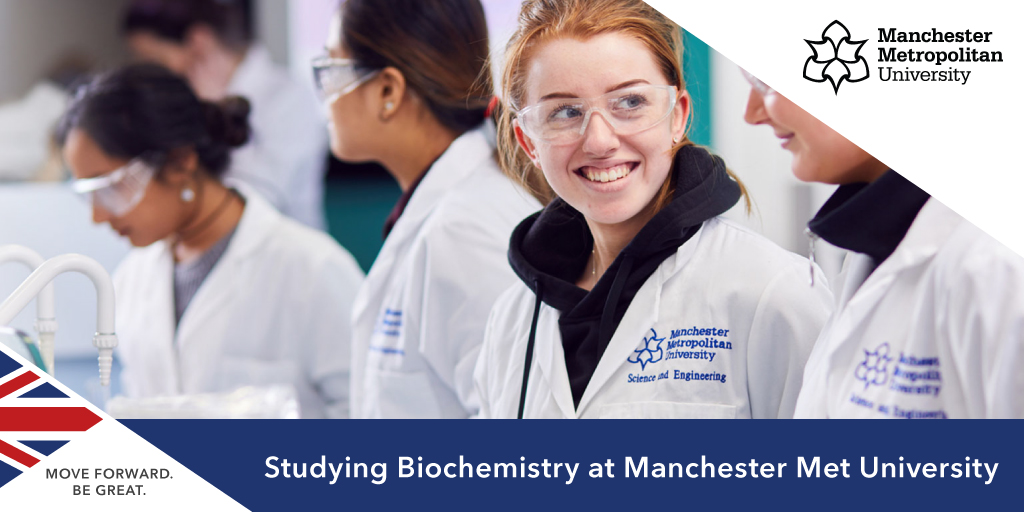Clinical Biochemistry is a branch of medicine that uses measurements of chemicals in our body fluids, like blood and urine, to help doctors diagnose, treat, and monitor diseases. These measurements tell doctors how our organs, like the kidneys, liver, heart, and thyroid, work. They also help check heart health by looking at things like cholesterol levels and can even help with diabetes management.
MSc Clinical Biochemistry at Manchester Met
The MSc Clinical Biochemistry programme at Manchester Metropolitan University (MMU) is all about arming you with the knowledge to fight diseases. You'll learn both the theory and hands-on skills to become a specialist in clinical biochemistry. This means you'll study various topics related to health, disorders, and how to use advanced lab techniques.
An exciting part of this programme is your chance to do your research project. You can pick a topic you're passionate about and work on it with the support of experts. The university even has strong connections with local hospitals, so you can research what matters in the real world.
Throughout the course, you'll get help from a skilled team and access to special labs. Plus, the programme is accredited by the Institute of Biomedical Science (IBMS), ensuring high-quality teaching that employers value. But please note that it doesn't lead to Health and Care Professions Council (HCPC) registration. For HCPC registration, you'll need to check the IBMS website.
Entry requirements
To be eligible for the MSc Clinical Biochemistry programme, you should have a UK honours degree with a minimum of 2:2 classification or its international equivalent in a field related to biological or biomedical science, with a focus on Clinical Biochemistry. Your application may still be considered if you possess an equivalent professional qualification or have substantial relevant professional experience.
If you are a member of The Institute of Biomedical Science (IBMS), you may receive exemptions from some course units. For international applicants, an overall IELTS score of 6.5 with no individual category scoring less than 5.5 or an equivalent accepted English qualification is required to meet the language proficiency criteria.
Study biochemistry at Manchesteretropitan University
Learn more below about Manchester Metropolitan University's biochemistry course. To apply, contact SI-UK for a free consultation today.

Why Study MSc Clinical Biochemistry at Manchester Metropolitan University?
1. Course structure and modules
In the Master of Science in Clinical Biochemistry course at Manchester Metropolitan University, you'll spend one year studying eight important units. Six of these units focus on different aspects of clinical biochemistry, teaching you the essential concepts needed for modern practice. You'll learn about disorders, advanced analytical techniques, and the latest developments in biomedical science used in real-world clinical situations.
- General Clinical Biochemistry: You'll dive into the essential concepts of clinical biochemistry, gaining a deep understanding of how it's practised today. You'll learn to apply your knowledge to solve clinical problems.
- Diagnostic Clinical Biochemistry: This unit teaches you to evaluate different methodologies and emphasises the importance of evidence when making decisions. You'll analyse scientific papers and reports to make informed choices.
- Disorder Case Study: You'll systematically study a specific disorder, enhancing your knowledge while also understanding the broader process of disorder analysis, a skill you'll carry forward in your career.
- Specialist Clinical Biochemistry: Delve into specialised areas of clinical biochemistry at the master's level. You'll develop expertise and critical thinking in specific clinical biochemistry practices.
- Research Project: This core unit lets you conduct independent research aligned with your interests and career goals, giving you hands-on experience in your chosen area.
- Analytical Techniques in Biomedical Science: Learn about the modern analytical techniques used in biomedical science. You'll gain a comprehensive understanding of these techniques and their limitations.
- Recent Advances in Biomedical Research: Engage in supervised independent study, allowing you to focus on a cutting-edge topic in biomedical research.
- Research Methods and Ethics in Biomedical Science: Develop advanced research skills and learn about ethical considerations in research. You'll become proficient in statistical analysis and evidence-based frameworks.
Throughout the course, you'll gain theoretical knowledge and practical skills that will prepare you for a successful career in clinical biochemistry. The research project is your chance to explore your passion and contribute to the field's advancement.
2. Great facilities
Students at Manchester Metropolitan University have access to state-of-the-art facilities. They learn in modern labs dedicated to blood biochemistry, cell and molecular biology, and tissue culture. These labs are equipped with specialised tools like clinical chemistry, lipid profile analysers, and Luminex and proteomics equipment used to measure important substances in our body fluids.
Furthermore, the university is investing in the future of its science and engineering campus. The Dalton building will open in 2024, offering a professional learning environment with world-class features. This includes a brand new Superlab that can accommodate up to 200 people, ensuring students are well-prepared for real-life industry experiences when they graduate.
3. Competitive tuition fees
International students' tuition fee for the full-time MSc Clinical Biochemistry programme is £19,000 annually. It's important to note that this fee will remain consistent throughout your course if you complete it within the regular timeframe without repeating years or taking breaks from your studies.
4. University ranking and reputation
Manchester Metropolitan University is recognised for its exceptional concentration of health research excellence, ranking 15th in the UK regarding the impact and quality of health and biomedical research, as assessed in the Research Excellence Framework (REF) of 2021.
5. Scholarship availability
- Undergraduate Scholarship
- Aimed at: Undergraduate students from outside the UK who will pay full overseas tuition fees.
- Eligibility: You must have been accepted onto a full-time taught bachelor's degree course starting in January 2024. This scholarship cannot be combined with any other financial support from Manchester Metropolitan.
- Value: £2,000 for each year of your degree.
- How to apply: Eligibility is assessed when applying to Manchester Metropolitan. No separate application is required.
- Postgraduate Scholarship
- Aimed at: Postgraduate students from outside the UK who will pay full overseas tuition fees.
- Eligibility: You must have been accepted onto a full-time taught master's degree course starting in January 2024.
- Value: £3,000 in the first year of study.
- How to apply: Eligibility is assessed when applying to Manchester Metropolitan. No separate application is required.
- Chancellor’s and Vice-Chancellor’s International Awards
- Aimed at: Exceptional international students with offers for courses in selected subject areas who will pay full overseas tuition fees.
- Eligibility: You must be a self-funding student with a strong academic background and have been offered a place on an eligible course.
- Value: Between £6,000 and £8,000 in the first year of study.
- How to apply: To apply, complete an online form and write a 500-word personal statement explaining your academic achievements, reasons for choosing MMU, and how your course will help you achieve your career goals.
6. Experienced faculty members
You'll benefit from a dedicated and knowledgeable team of educators and researchers who are experts in their respective fields. The Department of Life Sciences supports your studies and ensures a high-quality educational experience.
Key Faculty Members
- Head of Department: Carol Ainley
- Deputy Heads: Dr Jason Ashworth and Dr Gethin Evans
The Department of Life Sciences is home to diverse faculty members, including research fellows, senior lecturers, and programme support tutors. Dr Nessar Ahmed, a Reader in Clinical Biochemistry, brings expertise in this specialised field. Moreover, Manchester Metropolitan University fosters connections with external professionals, providing opportunities to enhance your learning and establish valuable ties to the real-world working environment.
7. Career options
After completing the MSc Clinical Biochemistry programme, you'll find a world of career opportunities. Here's what you can expect:
- Hospital Science: You can work in hospitals, helping diagnose and treat patients by analysing their biological samples, such as blood and urine.
- Biomedical and Pharmaceutical Industries: Many pharmaceutical and biotech companies require professionals with a deep understanding of biochemistry to develop and test new drugs and medical technologies.
- Advanced Practice: You can advance your career by taking the Institute of Biomedical Science higher specialist examination.
- Research and Teaching: Your knowledge and skills can lead you to a career in research, where you may contribute to groundbreaking discoveries. Alternatively, you can become an educator, teaching the next generation of scientists.
- PhD Studies: If you have a passion for research, you can pursue a PhD to delve even deeper into biochemistry and make significant contributions to scientific knowledge.
Manchester Metropolitan University ensures that your education remains relevant and up-to-date through its collaboration with the NHS and clinicians. This means you'll graduate with the skills and knowledge employers seek.
Study Biochemistry at Manchester Met
If you want to learn more about studying biochemistry at Manchester Metropolitan University, contact SI-UK today for a free consultation.
FAQ
What is the acceptance rate at MMU?
Manchester Metropolitan University's acceptance rate is 80%, which suggests that MMU is accessible to a broader range of applicants.
What is the difference between biomedical science and clinical biochemistry?
Biomedical science is a broader field that studies the science behind human health and diseases. It encompasses various aspects of biology, chemistry, and medical science to understand how the human body functions and what goes wrong in diseases. Clinical biochemistry, on the other hand, is a specific branch of biomedical science that focuses on analysing and diagnosing diseases by studying chemicals and biomarkers in body fluids like blood and urine.
What is the best postgraduate degree to do from MMU?
MMU offers various business, science, arts, and more programmes. The MSc Clinical Biochemistry programme at Manchester Metropolitan University (MMU) is highly regarded. It could be an excellent choice for your postgraduate studies if you're interested in clinical biochemistry and it aligns with your career goals.



 I sincerely thank SI-UK for getting me accepted to UCL. The MSc in Urban Development and Planning is extremely competitive, but the right guidance provided by SI-UK made my dream of studying at University College London a reality. The services were exceptional from beginning to end.
I sincerely thank SI-UK for getting me accepted to UCL. The MSc in Urban Development and Planning is extremely competitive, but the right guidance provided by SI-UK made my dream of studying at University College London a reality. The services were exceptional from beginning to end. 

